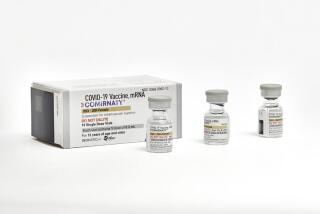Newly discovered Ebola-fighting antibodies could aid vaccine research
In the blood of a survivor of the recent Ebola outbreak, a team of researchers has discovered a number of antibodies that seem to successfully combat the deadly virus in mice.
The findings, published in the journal Science, may help point scientists in the right direction for developing a vaccine that could protect against the disease.
“The results provide a framework for the design of new EBOV vaccine candidates and immunotherapies,” the study authors wrote.
According to the Centers for Disease Control and Prevention, the 2014 Ebola outbreak in West Africa spread to more than 28,600 people and resulted in more than 11,300 deaths. Health officials struggled to curb the virus’ dramatic spread.
In the early days, many researchers thought that the virus managed to be especially deadly because it could incapacitate the body’s immune response, in part by taking out some of the white blood cells that could potentially manufacture antibodies to fight the invading pathogens.
Recent research, however, has shown that this may not be the case. Previous work published in the Proceedings of the National Academy of Sciences found that four Ebola patients treated at Emory University Hospital in Atlanta actually showed higher rates of activation in B and T cells – white blood cells involved in immune response.
See more of our top stories on Facebook >>
For this work, the scientists used a platform launched by biotech company Adimab to profile the B-cell response to the Ebola virus using samples from one survivor of the recent outbreak, known simply as “subject 45.”
The researchers found more than 300 antibodies that targeted the Ebola virus surface glycoprotein, a structure that the virus uses to latch on to host cells. Recent mouse studies have revealed certain vulnerable sites on this glycoprotein, but only a few antibodies targeting this weak spot have been found in human survivors until now.
Scientists at the Scripps Research Institute and the U.S. Army Medical Research Institute of Infectious Diseases then analyzed the antibodies, finding that 77 of them appeared to be able to neutralize the Ebola virus.
The researchers also tried different antibodies out in mice, injecting them with a single dose of antibodies two days after they were infected with a mouse-adapted form of the Ebola virus. Many of the antibodies offered significant protection at rates ranging from 60% to 100%, but the scientists found three particularly strong performers that each targeted a different weak spot on the Ebola virus glycoprotein.
The particular weak spots targeted by the most effective antibodies in this paper “may be promising targets for rational vaccine design,” the study authors wrote.
Follow @aminawrite on Twitter for more science news and “like” Los Angeles Times Science & Health on Facebook.
MORE SCIENCE NEWS
How scientists solved the strange case of the missing asteroids
Men on testosterone: marching feistier -- and a little happier -- into old age
In pregnancy, eating too much fish can raise a child’s obesity risk, study says







